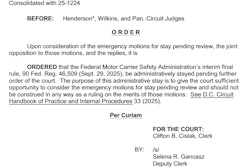Leander Richmond, owner of Eagle Express, a small fleet out of Canton, Michigan, thought he had just about seen it all from brokers -- spurious claims of “back solicitation,” ever growing “carrier vetting” and ELD tracking demands -- until a recent email from a broker hit his inbox.
Richmond had hauled for the middleman in the past. That broker had facilitated a load between Richmond and a big local shipper, who moved a ton of freight through multiple different brokerages over the years. Richmond had hauled at least a dozen of their loads over time.
But now the broker tried to tell Richmond the big shipper was off-limits.
“We wish to remind you of your obligations” under their broker-carrier agreement, the broker wrote Richmond. “Specifically, you are contractually obligated not to service lanes and shipments that you previously handled for [our brokerage] by accepting shipments from these customers, either directly from the customer or through another broker.”
That’s right, this broker claimed that because of a clause in the carrier agreement, Eagle Express could not haul another load from this shipper, even if the big shipper called him directly and asked.
The broker “appreciates its relationship with your company and wishes to maintain that relationship,” the broker continued.

Yet if Richmond did haul for the shipper again, that would violate the agreement and the broker “would be compelled to protect its interest.” Up to, the email went on, lodging a “lawsuit against you for damages or injunctive relief for breaching your no back solicitation obligations, as provided in the Broker-Carrier Agreement.”
Richmond didn’t take that well. He especially hates accusations of “back solicitation,” which he feels get abused by brokers looking to stamp out any hope of carriers doing their own sales for direct business.
“I get offended at the concept that they can tell us what to do,” said Richmond. “I got headaches and nightmares and bills and real problems. The last thing I need is some broker telling me what I can and cannot do.”
Overdrive has reported on some of the ridiculous contract language in broker-carrier agreements before. One broker demanded a carrier pay for a vetting service (under common ownership with the broker) before getting paid. TQL's agreement, notoriously (and among many other brokers'), contains language about “offsetting,” or withholding payment on several unpaid loads due to a claim on one load.
[Related: TQL 'offsetting' its way out of paying carriers?]
But what about a broker essentially claiming “dibs” on a shipper? Is that legal or enforceable?
Richmond thought no, and wasn’t afraid to say as much. He fired back, stating that Eagle Express’ relationship with that broker began in 2020, but they had hauled for the shipper since 2013 through at least 12 different brokers.
If the broker's "logic were applied consistently, then by the same reasoning, we would owe continuing allegiance to every one of these brokers, each claiming ownership or exclusive control over the same freight,” Richmond wrote. “That is not only impossible in practice, but nonsensical under federal law.”
As noted, the broker relied on a “no back solicitation” clause “that supposedly prohibits us from taking any” loads from the shipper “even if we are offered those loads directly by the shipper or through another broker,” Richmond wrote.
To abide by the broker's language would treat the shipper's freight as if it were the broker's property, and positions the broker "as a gatekeeper between us and the shipper long after a transaction is completed," Richmond wrote.
Richmond added it's "simply impossible for [broker] to assert ownership over freight that has moved through a dozen other brokers both before and after our limited work” with the broker. How could the middleman possibly know, too, if Richmond had hauled for the shipper again?
If the threat of a lawsuit wasn't enough, this particular broker had yet to pay Eagle Express for a load run 64 days ago. Another two loads had been waiting 42 and 54 days.
The broker’s “failure to make timely payments on these loads constitutes a material breach of the Broker–Carrier Agreement,” wrote Richmond. “By failing to maintain the agreed payment schedule, [broker] has violated the core terms of the contract, thereby rendering the entire agreement void.”
After sending off the letter, and with a few days of no response, Richmond reached out to Overdrive.
Overdrive then contacted the brokerage, and its Chief Operations Officer immediately backed off the legal threat, saying the shipper had just torn up a contract with the broker, and now the broker was messaging its entire carrier base in an effort to get back at the shipper. The shipper “gave us no notice and terminated our contract within a week’s time and said we no longer need your services," he said.
The legal threat, as Richmond suspected, was just a paper tiger. Basically, the broker sent out an empty threat to carriers telling them not to haul for the shipper in an effort to spook them, and maybe, just maybe, win back the shipper.
The COO noted the entire brokerage was built around trying to secure that shipper’s freight, and just a few days into the contract they tore it up, forcing the broker to lay off half the staff. Overdrive told the COO he might want to reach out to Richmond and clear that up, which he did.
“That’s terrible, I feel bad for him,” Richmond said after hearing from the COO. “In my conversation with him, he said he had carriers calling him saying, ‘If we go in there are you going to be angry?’”
Of course, nobody at the broker (including the COO) was going to wait outside the shipper and sue every carrier that hauled with them. But for Richmond, the broker v. shipper spat shouldn’t have boiled over into a threat aimed at carriers. “You think it’s OK that a carrier should have to call you and beg your permission to haul freight for someone else?” he asked.
The COO was apologetic, saying he was "raised better than that in this industry," and never sought to actually harm any carriers.
"But that didn’t stop him” from sending out the legal threat, Richmond noted.
Leander Richmond was busy trying to complete onboarding paperwork with another broker as he spoke to Overdrive. Sending and resending verification codes over and over that didn’t work during what was supposed to be “collections day” for him, spent hunting down payment from brokers that demanded he jump through hoops up-front but then who still violated their own agreements with slow payments.
[Related: A freight world without brokers: Carriers United daring to do more than just dream]
In closing arguments responding to the broker who threatened to sue, Richmond argued for carriers' rights to market and sell their services, and against the "insane" and "abusive" mindset of many brokers.
My truck payments are $3,000 each, and my trailers -- stepdeck conestogas --carry $880 payments apiece. Then there’s fuel, drivers, tires, damage repairs, windshields, DPF issues, and all the other expenses that come with operating in this industry. We are the ones taking the real risk. We buy the equipment, pay the insurance, shoulder the liability, and make the deliveries that keep freight -- and your business -- moving. Carriers SHOULD be the choice for transportation, because we are the ones who make it happen. Yet here you are -- with no trucks, no trailers, and no tangible assets -- acting as if the ability to offer “every mode” of transportation gives you power over me, my company, [the shipper], or their freight. That mindset is not only insane, it’s abusive. You should be thankful and humble to work with carriers like us -- not entitled to control the very people and assets that make your existence possible.









